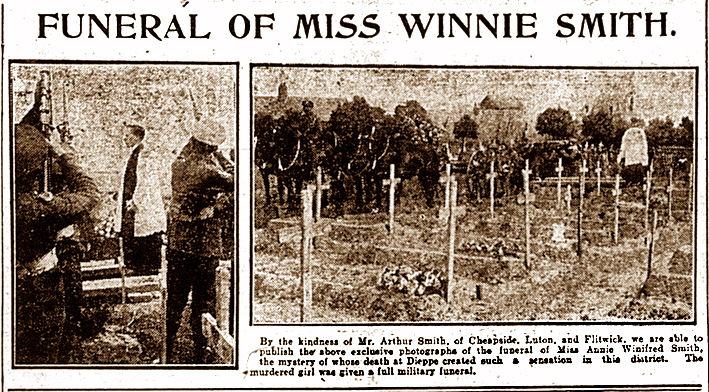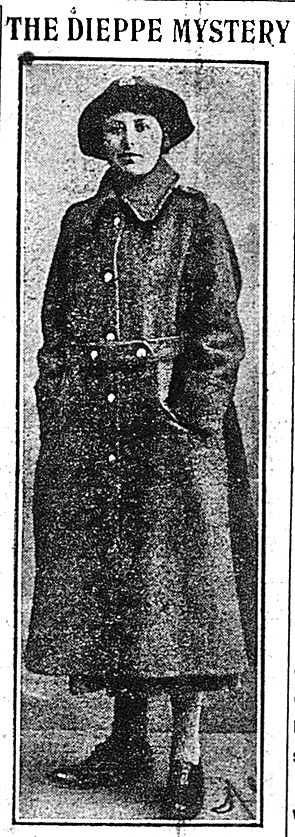
The discovery of the body of a Luton hat manufacturer's daughter on the sands below cliffs at Dieppe in France on June 13th, 1919, presented a big mystery about the circumstances of the death, wrote the Beds & Herts Saturday Telegraph (June 21) in breaking the news in Luton.
One account said that Miss Annie Winifred Mary Smith, known as Winnie, had been washed up by the tide, while another attributed the death to gunshot wounds. And a letter from a comrade in the Queen Mary's Army Auxiliary Corps later spoke of her having been “most wickedly deceived”.
Winnie, born on November 10th, 1894, was the eldest daughter of Mr and Mrs Arthur Smith, who lived in The Avenue, Flitwick. Mr Smith ran the firm of A. Smith & Co from premises at the corner of Cheapside and Silver Street in Luton. The parents left Luton on June 20th to travel to France to try to learn more about the circumstances of their daughter's death.
 Winnie (pictured right), aged 25 and engaged to be married, had been working with the QMAAC (previously WAAC – No 16754) as a baker and cook since December 1917, after training at Folkestone. Winnie had hoped to marry in London but was refused leave. She therefore asked her parents to consent to her marriage to a “Canadian” Staff Sergeant taking place in France. They gave their consent in a letter posted on the day of her death.
Winnie (pictured right), aged 25 and engaged to be married, had been working with the QMAAC (previously WAAC – No 16754) as a baker and cook since December 1917, after training at Folkestone. Winnie had hoped to marry in London but was refused leave. She therefore asked her parents to consent to her marriage to a “Canadian” Staff Sergeant taking place in France. They gave their consent in a letter posted on the day of her death.
News of Winnie's death reached her parents on June 18th in two official letters offering conflicting versions of events. A letter from the unit administrator at the Bakery Camp at Dieppe (dated Friday, June 14th) said she was absent from roll call on the Thursday evening and her body was found by a French woman behind a rock at the foot of cliffs, washed in by the tide. The cliff path was a dangerous one and accidents had occurred before there.
But a letter from the QMAAC Records Office in London said Winnie's body was in the 5th Stationary Hospital badly bruised and smashed and with gunshot wounds.
The parents had travelled to London for more information and complained that they should have received the news by telegram. Their daughter was already buried with full military honours at Dieppe [Janval Cemetery] before they received news.
They mystery of Winnie's death was compounded by a letter from her QMAAC comrade Blanche L. Osborne, then with her unit in Boulogne. Blanche wrote that she and Winnie had been good chums for 18 months. Her letter contained the telling sentence: “I know that Win placed every trust in the man she was going to marry, but was most wickedly deceived”.
On June 16th, two days after Winnie's body was found at Puy, near Dieppe, the body of her “fiancé” Staff Sgt Yeatman was found in the sea about 300 yards away. Military records show that a Court of Enquiry found that Winnie had been shot through the left breast by Yeatman and thrown fully clothed in her uniform from the cliff top. A second Court of Enquiry found that Yeatman had committed suicide with a revolver bullet through the heart. Yeatman was also buried at the Janval Cemetery, Dieppe.
At the time of Mr and Mrs Smith's visit to Dieppe it was thought that Winnie had found out that Yeatman was already married and she wanted to end the relationship, and that he killed her out of jealousy.
On June 11th, Yeatman had gone to a senior Chaplain of the Forces to arrange marriage to Winnie. He had claimed he was a widower, that his parents were dead, that he had no living relatives and no home address as he had been living in Canada. The Chaplain was not prepared to grant the necessary permission to marry as Yeatman was unable to give the names of anyone who knew him in England.
Although Yeatman was stationed as a baker with the Royal Army Service Corps at the No 8 Field Bakery in Cologne, he and Winnie spent time together and dined together while he was on leave in Dieppe. A post mortem also found that Winnie was more than three months pregnant by Yeatman.
Yeatman had no connection with Canada and was born in Petworth, Sussex, in 1884. He married Helen Beattie in February 1901 and they had four children living at the village of Upperton, near Petworth.
His wife had written to him to apply for special leave as one of his three sons had broken his arm, which needed to be amputated as a result. Instead he went to Dieppe to see Winnie. A Court of Enquiry heard that Yeatman was in the habit of going with other women, which caused a good deal of quarrelling at home.

